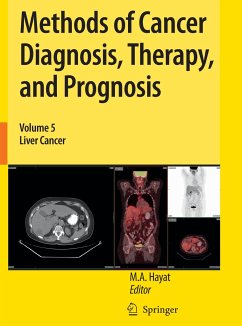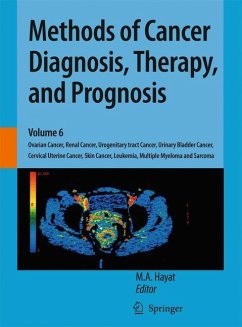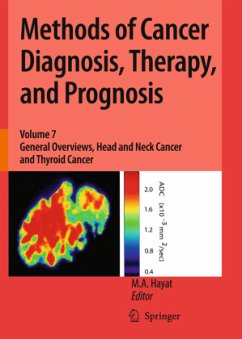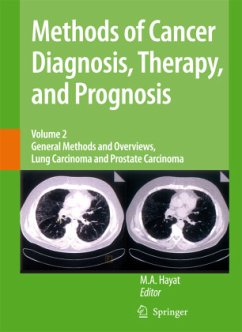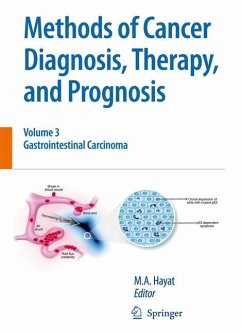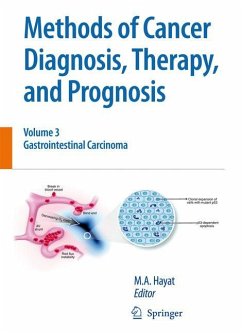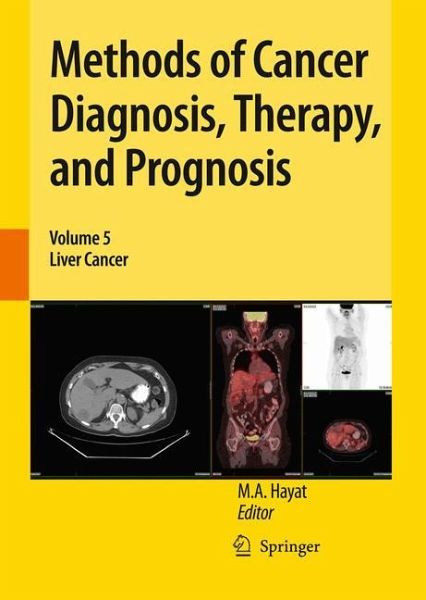
Methods of Cancer Diagnosis, Therapy, and Prognosis
Liver Cancer
Herausgegeben: Hayat, M. A.
Versandkostenfrei!
Versandfertig in 6-10 Tagen
228,99 €
inkl. MwSt.

PAYBACK Punkte
114 °P sammeln!
This fifth volume of the series, Methods of Cancer Diagnosis, Therapy, and Prognosis, discusses in detail the diagnosis, treatment, and prognosis of Liver Cancer. Both standard and emerging therapies for this cancer, written by expert oncologists/pathologists in this field, are included.
This fully illustrated volume:
- Is divided into 7 sections: Applications of Imaging, Resectable Liver Cancer, Unresectable Liver Cancer, Hepatocellular Cancer, Liver Colorectal Metastasis, Biliary Cancer, and Splenic Cancer.
- Discusses imaging modalities for diagnosis, treatment assessment, and prognosis.
- Includes descriptions of radial magnetic resonance imaging, helical computed tomography, magnetic resonance imaging, FDG-PET, contrast-enhanced sonography, multidetector-row computed tomography, and single photon emission computed tomography.
- Presents imaging methods for localized fibrous tumors of the liver, abdominal neoplasms, cholangiocarcinoma, gall bladder carcinoma, hepatic cellular carcinoma, extrahepatic disease, intrahepatic disease, focal liver lesions, biliary cystic tumors, extra hepatic bile duct carcinoma, and splenic metastases.
- Highlights methods for treatment of hepatocellular carcinoma (HCC) with thalidomide and transarterial treatment of hepatic malignancies.
- Discusses postoperative interferon alpha treatment of patients with HCC.
- Details the methods of immunohistochemistry, tissue microarray, and proteomic analysis for diagnosis and prognosis.
The technological advances presented in this volume are expected to expedite new discoveries and their translation to clinical practice. The field of oncology will benefit the most from these advanced methods, as a combination of therapies and personalized medicine will improve early detection of liver cancer and other cancer types.
Professor Hayat has summarized the problems associated with the complexities of research publications and has been successful in editing a must-read volume for oncologists, cancer researchers, medical teachers and students of cancer biology.
This fully illustrated volume:
- Is divided into 7 sections: Applications of Imaging, Resectable Liver Cancer, Unresectable Liver Cancer, Hepatocellular Cancer, Liver Colorectal Metastasis, Biliary Cancer, and Splenic Cancer.
- Discusses imaging modalities for diagnosis, treatment assessment, and prognosis.
- Includes descriptions of radial magnetic resonance imaging, helical computed tomography, magnetic resonance imaging, FDG-PET, contrast-enhanced sonography, multidetector-row computed tomography, and single photon emission computed tomography.
- Presents imaging methods for localized fibrous tumors of the liver, abdominal neoplasms, cholangiocarcinoma, gall bladder carcinoma, hepatic cellular carcinoma, extrahepatic disease, intrahepatic disease, focal liver lesions, biliary cystic tumors, extra hepatic bile duct carcinoma, and splenic metastases.
- Highlights methods for treatment of hepatocellular carcinoma (HCC) with thalidomide and transarterial treatment of hepatic malignancies.
- Discusses postoperative interferon alpha treatment of patients with HCC.
- Details the methods of immunohistochemistry, tissue microarray, and proteomic analysis for diagnosis and prognosis.
The technological advances presented in this volume are expected to expedite new discoveries and their translation to clinical practice. The field of oncology will benefit the most from these advanced methods, as a combination of therapies and personalized medicine will improve early detection of liver cancer and other cancer types.
Professor Hayat has summarized the problems associated with the complexities of research publications and has been successful in editing a must-read volume for oncologists, cancer researchers, medical teachers and students of cancer biology.
This volume presents a detailed survey of imaging, multidetector-row computed t- various methodologies related to diagno- ography, helical computed tomography, sis, therapy, and prognosis of liver cancer, ultrasonography, and power Doppler ult- including colorectal liver metastases and sound, for the prognosis and assessment of biliary tract carcinomas, while the already liver cancer treatment (including HCC) and published Volumes 1, 2, 3, and 4 detail liver metastases from colorectal cancer are similar aspects of breast, lung, prostate, discussed in detail, as is the use of radiof- gastrointestinal, and colorectal cancer, quency ablation in hepatic tumors. respectively. Approximately 50% of colorectal cancer Surgical resection is the standard therapy (CRC) patients develop liver metastases for resectable liver disease, resulting in during the course of their disease, and 5-year overall survival rates of 20-40%. more than 50% of patients who die of CRC One the other hand, the median overall have liver metastases at autopsy. Regional survival of patients with unresectable liver lymph node (RLN) involvement in patients metastases does not exceed 18-20 months, with colorectal liver metastases is one with a 5-year survival rate approaching of the worst prognostic factors. Recent zero. In other words, there is virtually no studies indicate that for these patients, long-term survival. Both resectable and combined liver resection and pedicular unresectable liver cancers are discussed lymphadenectomy can be recommended, in this volume. The method of selecting when RLN metastases respond to p- patients for resection of hepatic colorectal operative chemotherapy.




